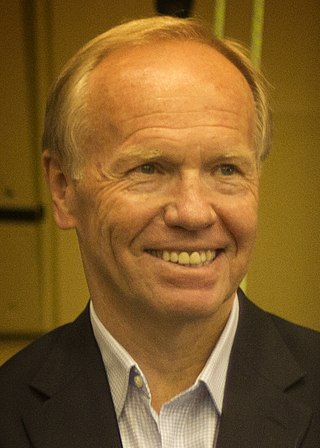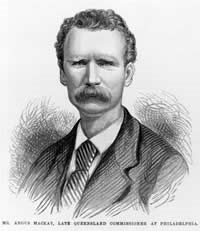Related Research Articles

Sir Samuel Walker Griffith was an Australian judge and politician who served as the inaugural Chief Justice of Australia, in office from 1903 to 1919. He also served a term as Chief Justice of Queensland and two terms as Premier of Queensland, and played a key role in the drafting of the Australian Constitution.

Peter Douglas Beattie is an Australian former politician who served as the 36th Premier of Queensland, in office from 1998 to 2007. He was the state leader of the Labor Party from 1996 to 2007.

Sir Charles Lilley was a Premier and Chief Justice of the Supreme Court of Queensland. He had a significant influence on the form and spirit of state education in colonial Queensland which lasted well into the 20th century.

The Lord Mayor of Brisbane is the chief executive of the City of Brisbane, the capital of the Australian state of Queensland, and the head of the Brisbane City Council. Lord Mayor Adrian Schrinner of the Liberal National Party was sworn in on 8 April 2019, following the resignation of Graham Quirk.

The Liberal National Party of Queensland (LNP) is a major political party in Queensland, Australia. It was formed in 2008 by a merger of the Queensland divisions of the Liberal Party and the National Party. At a federal level and in most other states, the two parties remain distinct and often operate as a Coalition. The LNP is a division of the Liberal Party of Australia, and an affiliate of the National Party of Australia.

Soccer was first played in Queensland on a regular basis in Brisbane, in 1884. The game in Queensland is administered by the peak body, Football Queensland, together with several subordinate zone councils, each representing regions of Queensland.
The Queensland Rugby Union, or QRU, is the governing body for the sport of Rugby union in Queensland in Australia. It is a member and founding union of Rugby Australia.
Elizabeth Jane Grace is an Australian politician. She was a Liberal Party of Australia member of the Australian House of Representatives from 1996 to 1998, representing the Brisbane-based electorate of Lilley.

Manfred Douglas Cross was an Australian public servant and politician. He was educated at various state schools in Brisbane in Queensland before joining the Queensland public service and later, in 1961, becoming a member of the Australian House of Representatives for the Division of Brisbane.
Toowoomba Grammar School is an independent, non-denominational, day and boarding grammar school for boys, in East Toowoomba, Toowoomba, Toowoomba Region, Queensland, Australia.

Frank Edwards Roberts was an Australian politician. He was Lord Mayor of Brisbane from 1952 to 1955, and was a member of the Queensland Legislative Assembly from 1947 to 1956, representing the electorate of Nundah. As with his predecessor as Mayor, John Beals Chandler, he was simultaneously Lord Mayor and a state MP. He represented Labor from 1947 to 1953 before resigning from the party; he was defeated for re-election as an independent for Lord Mayor in 1955 and as an MP in 1956.
Colin Charles Lamont was an Australian politician. He was a Liberal Party member of the Legislative Assembly of Queensland from 1974 until 1977, representing the electorate of South Brisbane.

Charles Stuart Mein was a politician and judge of the Supreme Court of Queensland.

St Mary's Anglican Church is a heritage-listed churchyard at 433, 447 & 449 Main Street, Kangaroo Point, Queensland, Australia. It was designed by Richard George Suter and built in 1873 by Alfred Grant. It was added to the Queensland Heritage Register on 21 October 1992.

The 2017 Queensland state election was held on 25 November 2017 to elect all 93 members of the Legislative Assembly of Queensland, the unicameral Parliament of Queensland.

Edwin Wesley Howard Fowles was a barrister, journalist, and member of the Queensland Legislative Council.

Angus Mackay was a journalist, trade commissioner, agricultural researcher and lecturer, and a member of the Queensland Legislative Assembly.
William Lambert Fowles was a politician in Queensland, Australia, successfully winning the seat of Clermont in 1878. He was a Member of the Queensland Legislative Assembly.

The Queensland Labor Party, officially known as the Australian Labor Party and commonly referred to simply as Queensland Labor, is the state branch of the Australian Labor Party (ALP) in the state of Queensland. It has functioned in the state since the 1880s. The Queensland branch of the Australian Labor Party (ALP) was the first Labour Party to win government in the world, when, in December 1899, following the resignation of the Dickson ministry, Labour Leader Anderson Dawson accepted to form a ministry by Lieutenant-Governor Samuel Griffith.
The National Party, known as the United Party from 1923, was a political party in the Australian state of Queensland from 1917 to 1925. Although allied with the federal Nationalist Party, it had different origins in state politics. It sought to combine the state's Liberal Party with the Country Party but the latter soon withdrew. In 1923 the party sought a further unification with the Country Party but only attracted a few recruits. Then in 1925 it merged with the Country Party, initially as the Country Progressive Party with a few members left out and then they were absorbed into the renamed Country and Progressive National Party.
References
- ↑ "QUEENSLAND LIBERAL ASSOCIATION". The Moreton Bay Courier . Vol. XIV, no. 870. Queensland, Australia. 24 May 1860. p. 2. Retrieved 29 May 2024– via National Library of Australia.
- 1 2 Allan A. Morrison (25 September 1953). Liberal Party Organisations Before 1900 (PDF) (Speech). Retrieved 28 May 2024.
- 1 2 "A thesis submitted to the Department of Humanities Central Queensland University for the degree of Doctor of Philosophy" (PDF). CQUniversity. March 2006. Retrieved 28 May 2024.
- ↑ "A Woman's Place… An historical archaeological investigation of identity and power on the nineteenth-century pastoral landscape of south east Queensland" (PDF). University of Queensland. 2014. Retrieved 28 May 2024.
Meanwhile, Premier Herbert had the backing of a small but influential group of urban-based parliamentarians, members of the Queensland Liberal Association (Fitzgerald et al. 2009).
- ↑ "QUEENSLAND". Australian Town and Country Journal . Vol. XIX, no. 493. New South Wales, Australia. 21 June 1879. p. 9. Retrieved 29 May 2024– via National Library of Australia.
- ↑ "The Liberal Association and the Ministry". The Brisbane Courier . Vol. XXXIV, no. 3, 774. Queensland, Australia. 23 June 1879. p. 3. Retrieved 29 May 2024– via National Library of Australia.
- ↑ "BRISBANE". Morning Bulletin . Vol. XXIII, no. 3494. Queensland, Australia. 24 June 1879. p. 2. Retrieved 29 May 2024– via National Library of Australia.
- ↑ "Bulletin of Maitland and District Historical Society Inc" (PDF). Maitland and District Historical Society Inc. February 2019. Retrieved 28 May 2024.
By the 13th May, 1879 Griffith was Leader of the Opposition and on 13th June, was elected president of the Queensland Liberal Association.